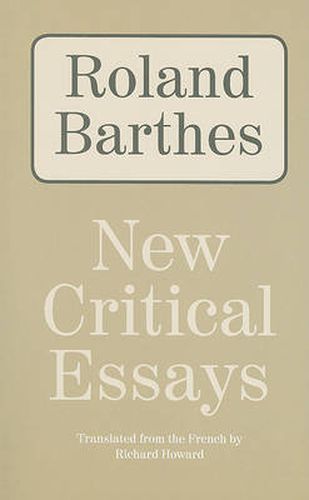Readings Newsletter
Become a Readings Member to make your shopping experience even easier.
Sign in or sign up for free!
You’re not far away from qualifying for FREE standard shipping within Australia
You’ve qualified for FREE standard shipping within Australia
The cart is loading…






New Critical gathers Roland Barthes’s essays on classic texts of French literature, works by La Rochefoucauld, Chateaubriand, Proust, Flaubert, Fromentin, and Lori. Like an artist sketching, Barthes in these essays is working out the more fascinating details of his larger theories. In the innocuously names Proust and Names and Flaubert and Sentences, Barthes explores the relation of the author to writing that begins his transition to his later thought. In his studies of La Rochefoucauld’s maxims and the illustrative plates of the Encyclopedia, Barthes reveals new vistas on common cultural artifacts, while Where to Begin? offers a glimpse into his own analytical processes. The concluding essays on Fromentin and Loti show the breadth of Barthes’s inquiry. As a whole, the essays demonstrate both the acuity and freshness of Barthes’s critical mind and the gracefulness of his own use of language.
$9.00 standard shipping within Australia
FREE standard shipping within Australia for orders over $100.00
Express & International shipping calculated at checkout
New Critical gathers Roland Barthes’s essays on classic texts of French literature, works by La Rochefoucauld, Chateaubriand, Proust, Flaubert, Fromentin, and Lori. Like an artist sketching, Barthes in these essays is working out the more fascinating details of his larger theories. In the innocuously names Proust and Names and Flaubert and Sentences, Barthes explores the relation of the author to writing that begins his transition to his later thought. In his studies of La Rochefoucauld’s maxims and the illustrative plates of the Encyclopedia, Barthes reveals new vistas on common cultural artifacts, while Where to Begin? offers a glimpse into his own analytical processes. The concluding essays on Fromentin and Loti show the breadth of Barthes’s inquiry. As a whole, the essays demonstrate both the acuity and freshness of Barthes’s critical mind and the gracefulness of his own use of language.